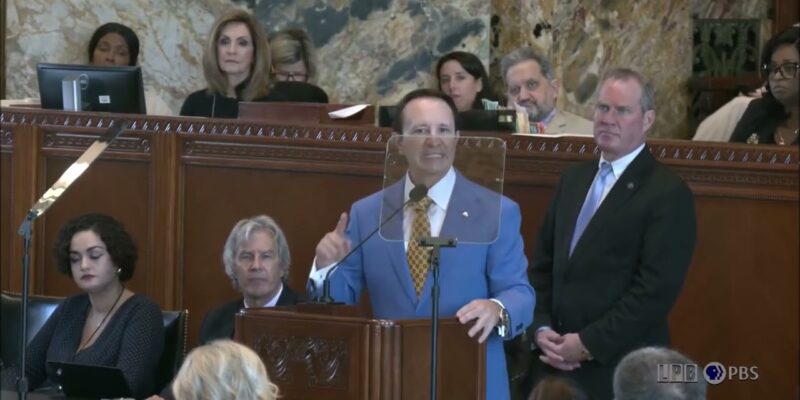(By Nolan Mckendry/The Center Square) — Louisiana lawmakers have finalized a sweeping overhaul of the state’s tax system, passing a package of reforms aimed at reducing income taxes, increasing sales taxes, and scaling back or eliminating certain tax credits.
Gov. Jeff Landry is expected to sign the legislation into law, which will significantly reshape the state’s fiscal policies and economic landscape.
Central to the package is a reduction of the state income tax rate to a flat 3% for all residents earning over $12,500 annually.
This move, projected to reduce state revenue by $1.3 billion per year, is paired with measures to offset the shortfall. The statewide sales tax will rise from 4.45% to 5% starting in January 2025, remaining at that level for five years before dropping to 4.75% in 2030.
Senate President Cameron Henry, R-Metairie, highlighted that the higher sales tax rate incorporates new business tax breaks, meaning it will generate less revenue than initially estimated.
To further address the revenue gap, lawmakers voted to temporarily redirect $280 million from vehicle sales taxes to the general fund, delaying infrastructure projects such as the Interstate 49 expansions and a new Mississippi River bridge in Baton Rouge.
Other changes include a doubled retirement income tax exemption for seniors, raising the threshold from $6,000 to $12,000, and the application of sales taxes to digital goods and services.
However, a proposal to expand the sales tax base to include dozens of new physical services failed to pass but may be revisited in the next regular session.
For businesses, the corporate income tax rate will drop from 7.5% to a flat 5.5%, and the state franchise tax will be eliminated entirely. Originally, Landry’s plan proposed a rate of 3.5%.
The aim is to bolster Louisiana’s competitiveness and attract economic investment, though some longstanding business tax incentives, like the Quality Jobs program and Enterprise Zone tax credits, will be scrapped.
Three high-profile tax credits — benefiting film and television productions, historic building preservation, and digital and software companies — will remain in place, but will operate with reduced caps.
The Ways and Means Committee heard testimony from representatives of all three, which were the proposals originally intended to eliminate.
“This program is working,” Tom Leonard, chief executive officer of HRI, a real estate development company, said of the historic building tax credit.
“I’ll lose millions of dollars. And we’ll move,” said Gerard Ramos, founder of Revelry, a digital technology company whose business heavily relies on the Digital Media Tax Credit.
The state inventory tax and its corresponding credit will also see changes.
Department of Revenue Secretary Richard Nelson acknowledges its removal poses challenges for local governments dependent on the funds. In some parishes, the tax generates over $30 million annually in some parishes but less than $1 million in others.
The proposal offers parishes a lump-sum payment equal to three years of collections if they voluntarily give up the tax, which costs the state over $280 million annually through reimbursement credits.
The Legislature also approved a plan to repeal the state’s corporation franchise tax, eliminating a long-standing levy on businesses operating in the state.
Currently, the tax applies to corporations using capital or property in Louisiana, with rates set at $2.75 per $1,000 of taxable capital above $300,000. The repeal also removes eligibility for certain tax credits to be claimed against the franchise tax, though these incentives remain applicable to corporate and individual income taxes.
The change aims to simplify the tax structure and improve the state’s business climate.
The reforms have drawn mixed reactions. Democrats have criticized the package for disproportionately benefiting wealthier individuals and corporations while increasing the burden on low- and middle-income residents through higher sales taxes.
“A flat income tax is inherently fair — everyone pays the same rate,” argued Daniel Erspamer, CEO of the Pelican Institute. “While higher earners see larger reductions, all taxpayers benefit, and the first $25,000 of income is tax-free, providing significant relief to lower-income families.”
Supporters of the reforms emphasize their potential to drive economic growth. Jonathan Williams of the American Legislative Exchange Council compared the package to the federal Tax Cuts and Jobs Act of 2017, predicting it could boost investment, create jobs, and ultimately make the tax system more progressive over time.
The Pelican Institute projected that the reforms could generate $4.5 billion in economic activity and create up to 5,000 jobs. He also noted that simplifying Louisiana’s complex tax code would reduce compliance costs, particularly for small businesses.
Many of the measures are tied to House Bill 7, which includes rewriting Article 7 of Louisiana’s constitution. The bill establishes a $2,000 permanent pay raise for school employees, reduces the income tax rate, and doubles the standard deduction.
Voters will decide in March whether to approve a constitutional amendment to consolidate state funds to pay down teacher retirement debt, a move that would free up school district savings to cover the pay increases.
Landry hailed the reforms as a victory for both residents and businesses. “This tax package is a win for Louisiana,” he said. “But there’s still work to do.”
Advertisement
Advertisement

